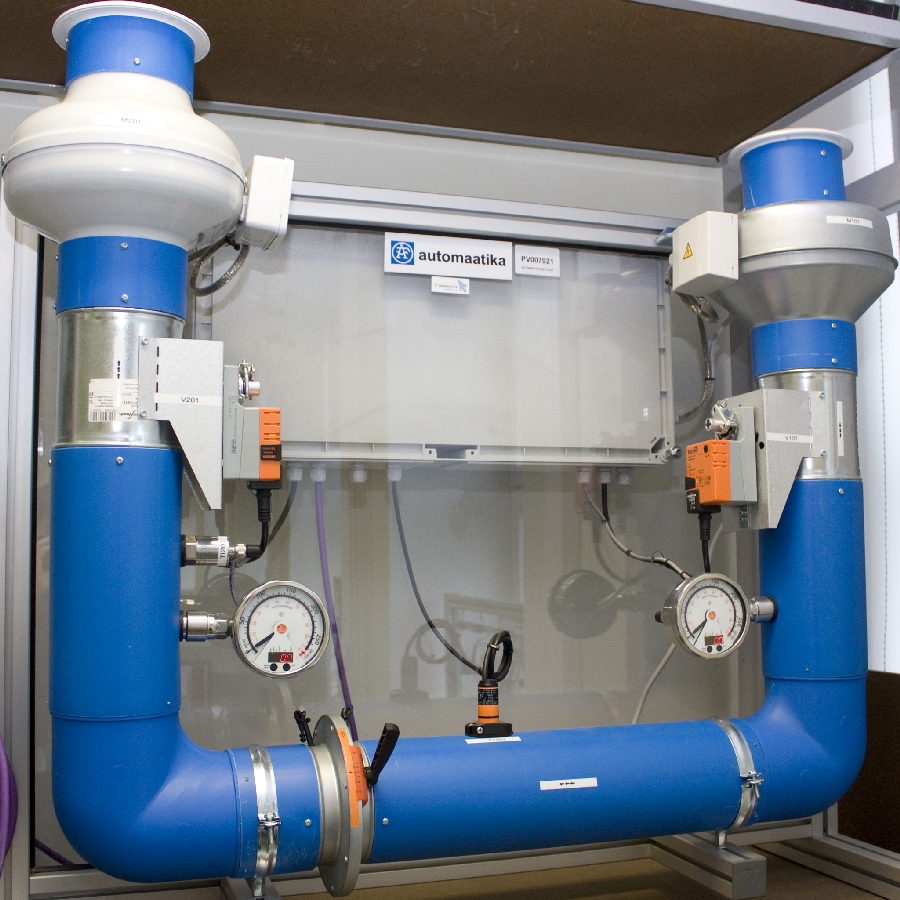Andmepõhise juhtimise ja tehisintellekti uurimisrühm
Data driven control and AI research group

Introduction
Centre for Intelligent Systems was established on January 1, 2017 in the Department of Computer Systems on the basis of Control Systems Research Laboratory, Chair of Automatic Control and System Analysis and Chair of Circuit Theory and Design from the former Department of Computer Control. All knowledge, skills, and expertise from Machine Learning and Control Theory have allowed the Centre personnel to proceed to tackle research endeavors related to Intelligent Systems with full force.
The research group focuses on development and implementation of data driven control techniques that improve energy performance and reduce emissions of technical systems. Data-driven control algorithms lying on the border between control theory, machine learning and data science have an important role on improvement of buildings’ energy performance making possible for control systems to acquire knowledge and learn from constantly growing data sets.
Competence
The Centre for Intelligent Systems focuses on advanced system modelling and control methods, data science, machine learning, AI, digital twins, as well as virtual and augmented reality based modelling and control systems.
Core competences of the research group lie in the fields of:
- Control, analysis and optimization of complex nonlinear dynamic systems;
- AI and Machine learning based algorithms;
- Self-learning and adaptation methods in control systems;
- Fractional-order control systems;
- Distributed control systems;
- Data analysis;
- Development of research software;
- Virtual and Augmented Reality applications;
- Digital twins;
- Energy efficient control;
The research group is also experienced in implementation of the developed algorithms in the form of software frameworks that enable implementation of advanced control techniques in practice ensuring efficient technology transfer.
The research group has strong background, long time experience and expertise in the research fields related to practical applications of computational intelligence methods. It has participated in several related research projects focusing improvement of buildings’ energy performance including several successful joint projects with other research groups.
Some examples of research topics and outcomes:
- AI methods for automated fault-detection of ventilation units’ heat recovery and filters and assessment the faults’ impact on energy cost and indoor climate.
- Algorithms for including buildings’ technical systems in demand response service with respect to indoor climate.
- Machine learning and AI based algorithms for data driven energy performance analysis of public buildings.
- Neural networks based dynamic feedback linearization algorithm based on a specific structure of the network. This is a unique solution making possible data-driven design of nonlinear state-space models of complex dynamic process and NN-based controllers as well as reducing training time.
- Genetic algorithms for automated choice of optimal structures of the neural networks and controller design.
- Design and application of deep learning networks to automated recognition of defects in road pavements.
- Machine learning and computational intelligence methods for short time prediction of electrical energy consumption. The outcome is a methodology that can be integrated into the energy company business planning software.
- Data-driven identification and control of the heating energy production process.
- Cyber-Physical systems and digital twins for the decarbonisation of energy-intensive industries.
- Data driven methods for analysis of the spreading rate of a virus as a function of human mobility and social distancing.
- Computational Intelligence based method for detection and evaluation of driver distraction induced by in-vehicle information systems.
In the recent years, cutting edge scientific results of the research group related to AI based control techniques have found several practical implementation as the result of successful technology transfer in cooperation with industrial partners. A system for data-driven identification, prediction and predictions based efficient control of the heating energy production process was developed and applied on one of Estonian District Heating Plants (industrial partners Valmet Automation and Iru Power Plant ); fuzzy logic based controller for efficient utilization of biomasses was developed and applied to control a District Heating Plant (industrial partner Valmet Automation); an AI based method for detection and evaluation of driver distraction induced by in-vehicle information systems was developed in cooperation with ŠKODA AUTO a.s. Advanced data driven modelling, control and optimization techniques have been implemented in R8 digital operator (remote control system for commercial buildings developed by R8 Technologies OÜ).
The research group is a part of Horizon Europe project “ENFIELD: European Lighthouse to Manifest Trustworthy and Green AI”. In the consortium consisted of 30 members from 18 countries, the research group is responsible for the Trustworthy AI based energy efficiency related work package.
Research infrastructure and software
Control Systems Research Laboratory is a part of the Centre for Intelligent Systems. It provides reach infrastructure required for successful development and validation of data driven control algorithms including laboratory pototypes of different types of industrial processes – from magnetic levitation to air pressure dynamics (see https://cis.ttu.ee/research/equipment/ for more detailed information).

As part of relevant research and development efforts, the research group has developed and made publicly available the following software packages:
FOMCON Toolbox for MATLAB
The toolbox contains several modules each providing particular functionality. Apart from the core module that also contains some utilities that could be useful even outside the functionality of the toolbox the following modules are available:
- The identification module allows to identify fractional-order transfer function models based on time series or frequency domain data;
- The control module that allows to tune fractional-order PID (proportional-integral-derivative) type controllers;
- The implementation module which helps to deploy the resulting models and/or controllers into actual control loops.
Graphical user interfaces are implemented to support the most important functions of the toolbox. A Simulink block library is also available.
MathWorks File Exchange link to the toolbox: https://mathworks.com/matlabcentral/fileexchange/66323-fomcon-toolbox-for-matlab
FOMCONpy toolbox for Python
FOMCONpy is a partial port of FOMCON toolbox for MATLAB to the Python ecosystem. It also contains some unique features such as the possibility to run real-time FOPID control using a SCADA-like environment. It is also usable on embedded systems such as Raspberry Pi 4.
Available at https://github.com/outstandn/fomcon
GPTIPS2F Toolbox for MATLAB
GPTIPS 2F toolbox for MATLAB is a fork of the original GPTIPS2 toolbox developed by Dr. Dominic Searson. The acronym stands for “Genetic Programming Toolbox for the Identification of Physical Systems” and “2F” refers to the fact that it is both a fork (of version 2 of the toolbox) and a functional update.
The updated toolbox delivers the following functionality:
- Preset Random Constants (PRCs): a subset of Ephemeral Random Constants (ERCs) the difference being that PRCs are randomly chosen from a predefined set.
- Automatically Defined Functions (ADFs): basically templates that are seeded into the initial population and can also arise naturally during mutation.
- Evolutionary rules: define rules for either outright killing individuals with certain undesirable traits or significantly decrease their chances of survival (alpha testing feature).
The fork is largely a work-in-progress (although it is already fully usable) with contributions from several Ph.D. students gradually being integrated into the toolbox.
The toolbox is available at https://github.com/is-centre/gptips2f-matlab
